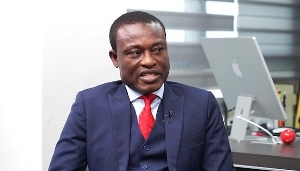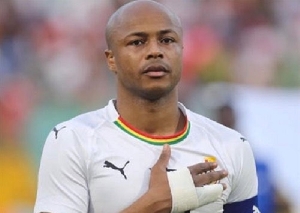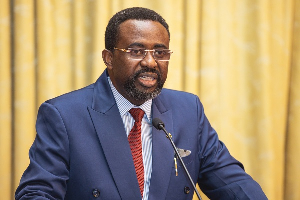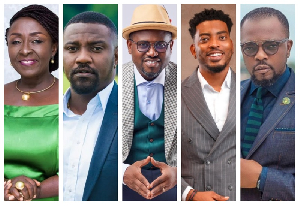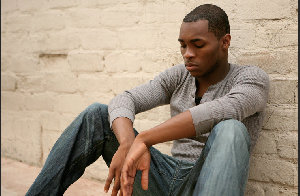This writer's recent article entitled "Leadership, Free Speech, Rawlings' Press Conference and Ghana's Democracy" published at www.ghanaweb.com on Sunday 13/04/03 received a lot of responses and views from many Ghanaians. Of the various and diverse views, one thing which few readers did not agree with this writer was his assertion that the 50% vote the ruling NPP government had in the Gomoa East election was not a pleasing victory for the growing democracy in Ghana. In his reasoning to such a point, this writer explained as to why some 50% citizens of the areas did not vote as either:
- the people are losing hope in Ghana's democratic direction (not specifically by NPP's rule but inclusive since it is also a ruling government)
- the people may have no reason to vote since they see no reason for doing so
- it is really perfect NOT to Vote than to Vote some CROOKS and RUFFIANS into political office
The following words, crooks and ruffians are defined by the Webster's dictionary and which the writer wishes to bring heretofore:
Crook is defined as swindler and swindler means a cheat; sharper, rogue. That is a person who cheats grossly and deliberately under the pretense of fair dealing.
Ruffian is defined as a brutal, boisterous fellow; any base, low character, as a robber, etc.
In multi-party democracy, it is the mass that rules the country by virtue of their votes cast in any fair election. By their votes, the party that receives the majority of such privilege becomes the ruling government through a specified time. The party (government) is then 'transferred' to and not 'given to', the power of the people to lead them. The real power in multi-party democracy is vested in the people, the citizens. The people can withdraw this kind of power at any time as agreed in the constitution. A president swears an oath of leadership to lead a group of people and by his allegiance, the power of the mass is transferred to him/her. S/he then becomes first among equals. The rights of leadership are also enshrined in the same constitution. The president cannot be sacked at will. It will take evidences of the abuse of either his/her office or failure of responsibility to bring him/her to book. This also takes some processes and impeachment is one of them.
There are some ingredients in this kind of rule. Voting is one of such ingredients. Mass participation of programs and activities for the total benefit of the mass and citizens is another. Safeguarding human rights and fairness, observance to the rule of law, diverse views and critique, ensuring accountability etc, are all mirrors within which one should use to reflect the performance of multi-party democracy.
Voting and not to
Giving rights to someone to manage ones affairs or asking someone to become a manager of a business is about trust and confidence one has in the said person. Assessment of such a person is done from many angles. Based on the authority one also expects accountability and performance from the manager. It should be emphasized that accountability becomes one of the useful ways the owners of the business can assess performance. When accountability is non-existent or not demanded, caretakers have the liberty to do their wishes. They may follow some of the wishes of the owner but s/he may care less. The situation becomes worse when the owner of the business does not have much or no knowledge at all in the particular business s/he has invested in. For example, a person who graduated (or did not) in Anthropology but invests in science research. His or her ignorance can be at a disadvantage to corrupt officials or managers. So one has to update him/herself or employ a trusted confidant.Multi-party democracy is likened to the scenario described above. It is dangerous to vote and ask some leaders to lead the country when one has no time to demand accountability. When one has no means to assess the ins and outs of the leadership of the country. It is dangerous particularly especially when not all the leaders are selected or voted by the people. Ministers are not voted into office by the people but they are chosen and vetted by the parliament or Senate where sometimes the president's majority will push his favourites through. But Ministers do not work by authority given them by the president. It is dangerous when voters do not know why they are voting, why they are selecting a president and some parliamentarians to lead them and the country. It is really dangerous to vote crooks and ruffians to become leaders, the writer said!
No one can do away with the fact that fairness is imaginary. In its application to democracy and voting there might not be fairness too but a common ground is often sorted for. Some people may vote under threat to their lives. Some may vote due to intimidation. Some people may and will vote in free atmosphere. Some will vote due to ecstasy, particularly when they are voting out a military rule or tyrant out of office. Some simply vote! However, vote is vote. It goes with all the power transferred to leadership. Whether one voted under any kind of threat or not, if the outcome of the result is accepted and announced by the electoral commission without any overrule by the judicial system, the vote is counted.
In Iraq, Sadam Husein received 100% vote cast in the election held early this year. By that vote, he was to run for another six year term of his 'rulership'. He was thought of by the international community as a human Dracula, a dragon to the people who gave him the mandate through their vote to rule them. Sadam Husein Abdel Madjid al-Tikrit, his name is. He tortured the Shi'ites for rising against him in 1990 Gulf War after they have voted him president. He is feared by so many in the Middle East. Is or was he the president the people wanted? In the Philippines, Joseph E. Estrada became president in 2000 by setting a record in the country's electoral history. He became the first president to win presidency with over 13 million vote casts, the most popular one. This former movie star with elementary educational level background was alleged to have abused his office through plundering to the tune of millions in dollars. He was sacked from office by 'people power' (demonstration) and became the only president to have been booted from office in 2 years, impeached, under arrest and waiting judicial rule. In Indonesia, former President Suharto was having health problem and it affected his ability to rule but was determined to clinch to power was sacked by the people through similar demonstrations like in the Philippines. Slobodan Milosovic was doing ethnic cleansing in Serbia. As a person, in spite of his good academic and professional background as even a lawyer he became president only to realise that there were some tribes, which do not fit to be in the country he was born.
In the African continent, there are ample evidences of presidents who are simply torturing their civilians. B. Campoare as a military ruler became president in few months. So was the case in Gambia and Niger. In Togo, Eyadema has been winning the elections for years now and becoming one of the longest serving military-turned-presidents in the eyes of ECOWAS member states and Chairman. He himself was once an ECOWAS Chairman. Arap-moi won many elections in Kenya until he may not be able to rule again before he bowed shamely. Mugabe is simply torturing all the opposition party members, demonstrators and innocent Zimbabweans for refusing to agree to his power and helping him accomplish perhaps nothing in Zimbabwe. In Burudi, the president condoned and connived with Tutsis to cleanse the majority Hutus. When some North Koreans are dying of hunger the president recently visited a military base and said he was satisfied with the preparedness to 'hit back the enemy' (CNN News, April 2003) - USA - when USA has not declared any war. Are these the presidents the mass and people of those countries concerned voted for?
The truth is those people mentioned in this article are presidents. Most or all have been voted into office by (supposedly) popular vote from the mass to lead them. It is this power of voting or the consent of the people through voting that has given the said leaders the right to rule and torture its innocent civilians. The rights to beat, maltreat, kill and displace its peace loving citizens. Some leaders are leading their citizens to war and ethnic conflicts resulting in mass death of innocent life.
To avert the abuse of power and ensuring mass rule, citizens are encouraged to participate in political programs. This move also serves to act as a check and balance and to evaluate performance for accountability. Voting could be the means to democratic dream but accountability is the end. It is the justifiable end where all and sundry will enjoy the satisfaction of democracy.
One does not demand accountability in ignorance. One needs to study, have a knowledge in, of some sort and appreciate what one demands accountability about. If there is too much distance between people and the government, one will misjudge the effort of the government or resort to subjective criticism. One will not appreciate the modest perhaps, the effort of the government when one does not have time to demand accountability through fair assessment. The risk is, when one refuses to demand accountability then officials, managers and governments have the damn right to do what they please. If accountability is ignored or its effective benefits are misjudged, crooks, ruffians, criminals and what have you, parade through the political stage as refined politicians. Then when they win the elections, they show their fangs and demonstrate their inanimate behaviours.
Democracy is not simply about voting. In Ghana, the struggle for independence was won through dialogue and voting. In the days of Nkrumah, Paa Grant and the Fante Confederation etc, voting was used as a tool to wipe away colonial nonsense. That is not to say Ghanaians voted without knowing what they were doing, it is also fair to say that the real meaning of voting then was just the joy of sacking the whites as noted by Nkrumah, 'we prefer self-government in danger than to servitude in tranquility'. It is also a fact that even up till today, there are many Ghanaians who vote because they want to, sack a government they are fed up with or change the government and see if the next one can build the road near them, etc. Many also have the true meaning of voting in mind before voting.
For Ghanaians to be confident about voting, to ensure effective and sustainable democracy in Ghana and perhaps, forever, the farmer in the isolated bush or village, the noisy street vender, the happy money-making market seller and business men and women, the elite in comfort air-conditioned rooms, the academe and in fact all people should have a reflection and lessons on what multi-party democracy is about. That people and families in different political parties pose no threat at all. That one needs not always has to vote for his/her party even if the leader cannot deliver. That voting an MP is not a pressure and an assurance to always lobby for development projects. That voting also means participation and why people should rise against military rule even under any circumstance. That sharing views, ideas and critique should not always be seen as an 'anti-ruling party'. That national interest, Ghana's interest shall always be put far and beyond individualistic, tribal or group interests. Seeking Ghana's interest is to call for liberation and success for 18 million people and that surely is democracy.
The writer is not seeking to say that what is going on in Ghana is wrong. He is trying to say that what percentage of Ghanaians understand and appreciate the fact that by voting NPP, H.E. Mr. Kufour into office, if he fails it is the failure of Ghana and all the parties therein than a mere NPP or political mess? What percentage of Ghanaians appreciate the truth that political parties are means to express diverse opinions and alternative strategy to Ghana's problems than a platform for war wording, name calling, casting insinuations and personal but mischievous hopes? That the appreciation of any political ideology be it Danquah-Busia's, NDC-Nkrumah's, PNC/CPP-Nkrumah's etc is a personal identification and conviction and not a point for fighting among individuals in Ghana?
The writer in his article "Leadership, Free Speech, Rawlings' Press Conference and Ghana's Democracy" also encouraged the NPP government that if it wins the next elections it should make attempts to let people appreciate and be encouraged to play active roles in democracy. He advised on a strategy that should start from the grassroots. In his vetting at parliament, Mr. Alan Kyeremanteng, the former ambassador to US but now a Minister of Trade and Industry designate stated, "his programme will have rural dwellers as the propellers. Any development strategy that does not fully involve the rural masses can only produce growth in statistical figures but not real growth". The writer wants to add that, any program including governance (from NPP, NDC, PNC, CPP, etc) that does not include the mass can only serve as a refined dictatorship in democratic house. It will only produce insignificant results.
It is also important to add that democracy is not democracy when majority do the voting and minority do the governance as it was in Iraq and some other countries. Democracy without accountability is not democracy, for democracy as governance has owners and the owners are the masses who do the voting. Certainly, if people have no interest in governance they may not vote at all. When people have no reason to vote they will not vote. When people feel disappointed in government they will not vote. When people do not like the trend of leadership and how their ships are being canoed they will not bother to help. They will simply refuse to vote.
As has been stated by this writer earlier in this article, voting is a right and in fact one of the ingredients for democracy. Just one of them and not all. Voting is a means to democratic governance and accountability for justice and mass benefit is the end for good/mass result. If one has no time to demand accountability, as said previously by this writer, it will be reasonable for one not to vote than to vote and vote anyone into office. The end result of voting any ruffian into office by virtue of the phrase most popular in Ghana, ' your vote is a right to be exercised' can have a disastrous end as the case in Iraq and Serbia.
Voting for one thing is a right just as accountability. They go together. It will only be mischievous individuals and persons who will demand votes and not accountability.
P/s: I welcome criticism and comments.







